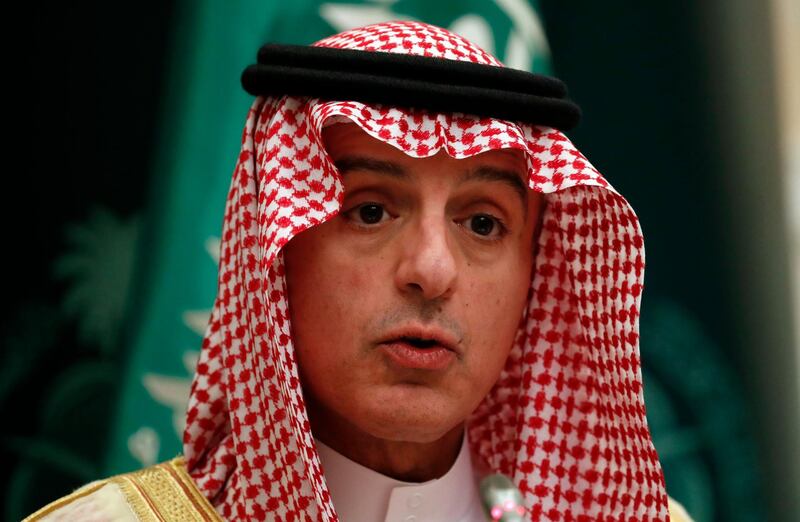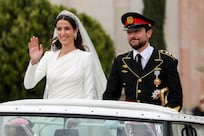Adel Al Jubeir, the Saudi Arabian foreign minister, pledged to boost relations with Iraq to a “higher, strategic level” to provide Baghdad with an alternative to pervasive Iranian efforts to exert control over the country.
Addressing the annual Chatham House conference in London, Mr Al Jubeir resisted the growing clamour to call the end of American global supremacy, describing Washington’s diplomatic influence as indispensable to the world order. “I don't believe the US is retreating or that the US has an interest in doing so,” he said. “The US is indispensable in terms of security in the region.”
Saudi Arabia’s recent strategic shift to embrace the government of Haider Al Abadi has been set against the backdrop of the fall of ISIL, which has seen Shiite militias that are backed by Iran spread their footprint north from Baghdad.
The veteran Saudi official pointed to the deep history of Iraq and the extensive tribal links between his own country’s population and those in Iraq. As a Gulf state with deep oil reserves, Iraq needed investment to rebuild. This endeavour would leave Baghdad less vulnerable to external influence.
“We want to co-ordinate with Baghdad at all levels,” he said. “We want to invest in Iraq, which is a wealthy country that needs to rebuild and we want to be their partner.
“Iraq is an Arab country, Iraq is a Gulf country. Iran’s interest is to dominate it completely. We don’t look at Iraq in terms of sects. We support all Iraqis.”
____________
Read more:
Saudi's Mohammed bin Salman promises return to 'moderate open Islam'
Rex Tillerson warns of 'those looking to exploit Qatar crisis' to destabilise region
____________
Saudi Arabia’s strong backing for President Donald Trump’s decision to decertify Iran’s compliance with the 2015 nuclear deal was based on the obvious flaws in the agreement. Iran had used the resources from the deal to fund a massive acceleration of its “nefarious activities” throughout the Middle East. The Iranians behaviour made a mockery of sunset clauses in the agreement, which could see the nuclear programme resume expansion within a decade. “If they are causing all this mischief without a nuclear weapon, what would they do if they had the bomb,” he said.
Speaking to an audience that included Dr Anwar Gargash, the UAE Minister of State for Foreign Affairs, and Lana Nusseibeh, the ambassador to the UN, Mr Al Jubeir said Mr Trump’s demands - for a tighter inspections regime, more sanctions targeting cross-border meddling and an extension of the sunset clause - deserved support. Pressure was needed to curb Iran’s behaviour.
“It is not acceptable, and there will be consequences to the Iranians. This is what President Trump has said, and we are very supportive of that.
“The international community needs to support those [sanctions] in order to send a very strong message to Iran that your behaviour, your nefarious activities, have consequences.”
Taking up a line from Boris Johnson, the British foreign secretary, who had opened the two-day conference, Mr Al Jubeir warned that ensuring Iran did not develop a nuclear weapon was key to the historic goal of non-proliferation.
“If we can stop the Iranians we can go a long way to stop non-proliferation but if we can’t the genie is out of the bottle.”
Pressure on Qatar to tackle terror organisations based in the state and repudiate its support for extremism has resulted in some shifts in Doha’s policies, he said, but added the boycott would stay in place until there was a change of heart.
“The problem is terrorism, terror financing, the problem is harbouring individuals who are wanted for financing terrorism, the problem is not taking them to justice and the problem is allowing them to destabilise your neighbours. It depends on what they do,” he said. “Are they going to convict and prosecute?”
“We had a problem, we acknowledged it and we dealt with it.”
Speaking on a panel that reflected on the outcomes of the conference, Mrs Nusseibeh said that despite discussion of American retreat, Washington remained at the heart of a global system of burden-sharing as the best approach to solving conflicts and disasters.
She pointed to the US role in reform of the United Nations as proposed by Antonio Guterres, the new secretary general. “I don’t think that the US is diminishing its role in the United Nations. I think this is a misunderstanding. What we are seeing is the US putting its momentum behind reform at the UN and the effects of US pressure for change.”






